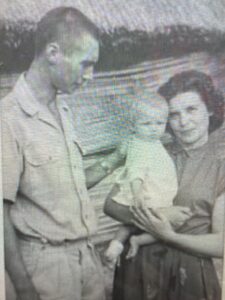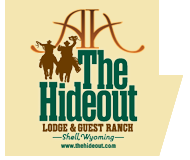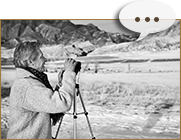A Pioneer’s Father’s Day
This story is about my dad, and he is not a “cowboy.” My parents were pioneers — much like the pioneers who traveled to Wyoming. But they traveled to another continent, Africa.

Dad riding after cattle on Antelope Butte in the Big Horn Mountains
Dad just turned 90 years old, and he is in exceptional condition, both physically and mentally. Longevity and good health run in his genes. He also lived an ascetic life. I have often seen him riding his bike and hiking, and he is always studying many topics. He seems to have a photographic memory and can talk about nature, geography, wildlife, agriculture, history, forests, soil, archaeology, economics, hiking trails, etc. Often, he would offer long monologues, retelling a ton of information. Sometimes, though, listening to this waterfall of facts was not always interesting to me and my siblings. Yet, now looking back I learned so many things listening to him. My dad was also the eternal pluralist. He always taught us to look at issues, problems, opinions, and situations from different points of view. In discussions he would always play devil’s advocate, each time highlighting and arguing opposite positions to make us reflect and be more critical and open minded. Very confusing for my siblings, but I loved it, and I guess that is why my religion is also pluralism.
Dad was also far ahead of his time in conservation and how people were destroying the planet through our economics. “People are what they eat; eat garbage and you become garbage,” he used to say. Often, he was more academic than practical. Yet, he opened our minds, to see the big picture. At 90, he continues to share his knowledge, but in moderation now. And last year, he reluctantly changed his old mountain bike to an electric one because all his friends have electric bikes now, so he needed to keep up with them. And since he is competitive, he did not want to let them get ahead.
Full life. Many adventures. Starting with Granddad.
Dad’s dad, my granddad, was head of the mounted police and a great horseman. Granddad was stationed in Ypres (known in WWI as Flanders Fields and the many WW1 war graves), in Antwerp, and his last station was in Brussels, where he was head of the Mounted Police and riding school. The years prior to the start of WW2, granddad worked for the police force in counterintelligence. When WW2 started, Granddad was immediately arrested by the Germans and imprisoned, first in Brussels, but later he was moved to Aachen, Germany to a special interrogation prison where he remained for year. For some reason he was one of the happy few who came out alive. In the meantime, in Belgium, my grandmother, my dad who was 8 years old, and my aunt, who was 4 at the time, were living on the farm of my grandmother’s parent’s farm in Boutersem, a small town outside of Leuven.
Back in Belgium, granddad went clandestine and joined the underground resistance groups. Working as a double agent, he hired on at one of Hitler’s Schutzstaffel (SS) Party Officers’ headquarters as a ranch hand, farming during the day while gathering intelligence. During the night he used radio transmitters and decoding devices hid in the hay barn to inform the Allied Forces about enemy movements. Granddad would pick up English paratroopers, hiding them in the same barn, and help smuggle them out of Occupied Territory to Spain by way of France. His intelligence work also included rooting out spies and sabotaging and derailing trains. Whenever possible, he visited my grandmother at the farm, giving her coded messages to transport on her bike across war zones. While my grandmother’s parents took care of their children, Grandma also smuggled messages to France and riding her bike, smuggled food raised at their farm to share with her family and others living in Brussels, where one of her sisters had a bakery shop and the other sister a butcher shop. Granddad was eventually imprisoned, deported, and spent time in concentration camps, but he escaped and went undercover again. After WWII, my granddad was highly decorated; we all revered him for his bravery. But mostly we were impressed how he never held a grudge towards the previous enemy after the war was over.
Granddad was tall, tough, and disciplined with piercing blue eyes. When his laser sharp eyes zoomed in on you, there was no escape; they went straight through you. For two years, I lived with my grandparents, and I can only imagine it was not easy for my dad to grow up under the authority of such a father — maybe that is why Dad escaped to Africa. But much like his dad, my dad loved reading and learning, exploring, and traveling. And much like his dad, he lived by strong principles, which he was not afraid to stand up for.
Going to Africa: A Longtime Dream and Happy Years
My father studied agricultural engineering specializing in tropical agriculture at the University of Leuven, the second oldest Catholic university in Europe after Bologna, Italy. His dream was to pioneer the Congo, a Belgian colony at the time. Today the Belgian Congo is the Democratic Republic of the Congo in Central Africa, an area 80 times the size of Belgium.

As the “boy scout” he was, to make the trip he asked the Belgium authorities if he could travel to one of the most remote areas where few other foreigners had been. Belgium was a very Catholic country then so, with a condition from my grandparents (influenced by the local priest), my dad could not leave for Africa without a wife. Dad, a very shy, six-foot-two athletic young man, asked several young women if they would marry him and travel to Africa. My mom, who was five years older, said “yes!” immediately. Three months later, they married and boarded the boat to Africa. Dad wanted to go to the most uncivilized and remote (adventurous) area in the Congo. They traveled by plane and car for weeks to get to their destination.
Pointing at the Area Where My Parents Lived in Northern Belgian Congo
Once there they established a team of employees, improved the hut they were offered, and increased their faculty of the local language.

While my mother stayed behind at the official post, Dad explored the area on foot during five-to-six-week trips with packers, mapping, taking soil samples to see which crops could be planted, and maintaining the upkeep of the basic road system that was in place. My parents were 350 miles from the closest settlers, dentist, doctor, food, medicine, ammunition, and fuel. To reach these necessities, they would drive the long trip in a Peugeot 403 pickup truck. During the rainy season, they crossed the crocodile- and hippo-infested streams on primitive rafts made from trees with the loaded vehicle while holding onto big ropes to prevent the entire lot from being dragged downstream. Both my parents loved every bit of their adventures.
A Big Country; Imagine Crossing This Area During the 1950s in a Little Pickup!

Dad hunted antelopes, reebok, buffalo, wild boar, and other game for meat. He always told us that buffalo, wild dogs, and baboons were the most dangerous animals— not lions, snakes, or leopards.
Dad, Mom, and My Sister in Front of the Hut They Lived In
During their work in the Congo, my sister was born in 1958, and I was born in May 1960, just before the revolution and independence war broke out. When the war began, Mom and Dad took care of many people fleeing the killing zones, helping them cross the border to the Central African Republic — a very dangerous trip as you can imagine. Most of these refugees came from cities where they had seen horrible things and lost siblings, friends, family, and employees.

My parents initially stayed behind, but in the end, Dad decided to smuggle Mom, my two-year-old sister, and me at three-months-old through the jungle across streams using primitive dugout canoes to the Central African Republic. With the help of the French Army, he managed to get his little family on board one of the last planes to leave the area. My parents realized they might never see each other again.
After escaping through the jungle, putting us on the last plane out – August 1960
As men had to stay behind, Dad remained hidden for several more months in the bush. He finally managed to escape back to Belgium via a long adventurous trip through dangerous areas in Belgian Congo, Central Africa, Chad, Cairo, and to Paris via Zurich, and finally back home. He was lucky because many Belgians and others were murdered, and many women and children were sold or distributed among the rebellion forces.
Sense of Lost Time …
For my parents those years in Belgian Congo were some of their happiest ones. Mom, who has passed away, pretty much got stuck in those times. Sometimes we kids believed she never overcame that adventure. As kids we remembered, almost every day her mind drifted off to “the Congo.” During her Alzheimer’s years, she forgot everything except her life in Africa, just as if she was there last week. Like many of the colonials who lost everything and returned to their home country penniless to start over again, she cherished her days in the Congo with vivid memories.
Traditionnel Life with a Twist

Back in Belgium Dad quickly found a job as Farm Consultant for the largest agricultural company in the country where he worked the rest of his career. He was contacted many times to take jobs overseas, but I guess he lost his appetite for that kind of adventure.
Instead, Dad and Mom raised a family of five kids. He focused his sense of adventure on taking many long bicycle trips across Europe, including across every Tour de France Mountain.
In 1967, Many Adventures and Five Kids Later
During Dad’s career, he designed low-stress pigs, chicken, and diary stables, and managed and negotiated contracts between farmers, intermediate livestock dealers, and processing plants. As kids we loved to travel with him. During summers, we worked on farms, worked with livestock buyers, and went to markets. Dad also loved forestry and property management, and he always took a long-term view on whatever he did. He planted a lot of oak trees for people to enjoy 300 years from now. Spending time with him and my uncle, who had a landscaping business, taught me about property management, which is one of the things I enjoy most managing and owning The Hideout.
Our family vacations in the Alps included hiking mountains every day, and as soon as we got home, Dad would study maps to see which hikes we would undertake the next day. He was a good father and was always a loner, and although he loved his family, it was not always easy to be close to him. The only time he gets emotional is when he talks about the Congo.
Connecting to the Wyoming Settlers…
Circling back to Wyoming, Dad was never keen on visiting his sister Paula, in Palm Beach or Boca Raton, Florida. Not really his thing, and he always looked at Florida as a place where “old people” went. At 90, Dad still thinks that way, but you can imagine what he thought when Paula moved to Wyoming in 1994, marrying her second husband, David, who was born and raised in the Shell Valley, and after her first husband of many years passed away.
It was in Shell where they built The Hideout, our ranch and guest ranch. Dad was the first one to visit his sister here. At that time, he was in his 50s, and for many years, he came to Wyoming for four to six weeks at a time. During that time my mom started to suffer from Alzheimer’s disease. Dad took care of her for many years at home, but in the end, Mom had to go to a home where she lived for several years. Sad times.
Dad could ride well because my granddad made him join the military riding school and fencing academy at a young age. As a rider myself, I would say my dad was a product of the military riding philosophy of that era — not really into natural horsemanship or fine riding — what we teach here at the ranch. But he could stay on a horse and was fearless no matter what. Here at The Hideout, Dad rode horses, helped on the ranch, and of course, rode his bike across the entire area and up the Shell Canyon on a regular basis. In no time Dad knew more than most people about the history, geology, plants, nature, and wildlife in the Valley.
When I moved to Wyoming in 2006 (Marijn and the kids joined me here in 2007), Dad he was sad to see our family leave Belgium. In his heart though, Dad was happy and proud some of the family ventured out of the country. And through our move to Wyoming and the adventures we share, he has relived some of his own. Dad has lived a full life.

My dad at 85 during his last trip to Wyoming
Here is to you Dad. Happy Father’s Day.
Life in Wyoming – Rain … Rain … Rain

Just keeps raining and raining … and raining
Exceptional rain in Wyoming
As you may have noticed, Wyoming is enjoying or being challenged by exceptional amounts of rain this spring and early summer. Shell Valley, where Marijn and I live, usually gets around six or seven inches on a yearly basis. In just four weeks, we had five inches of rain, and everything is lush and green. I will write more about that and the challenges the rain brings as a ranch and guest ranch owner/operator in another blog soon.


